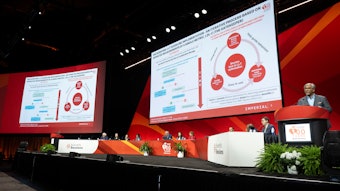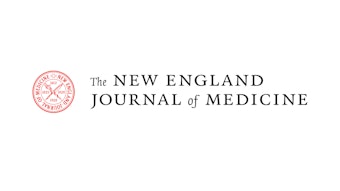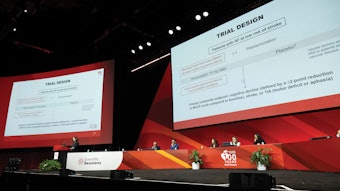Nurses drive programs, clinics to treat heart disease
Initiatives committed to shared decision-making and evidence-based care can improve patient outcomes.

Clinical programs described at a session Saturday help show how nurses can be vital guides for cardiovascular patients on the road to better health.
At the session, “Clinical Initiatives Driving Meaningful Change for Patients With Advanced Heart Disease,” four nursing leaders explored unique elements and benefits of nurse-led clinics and programs for cardiovascular disorders.
“Nursing is the most trusted profession,” said Megan Streur, PhD, ARNP, of the University of Washington School of Nursing in Seattle. “When patients and their loved ones trust their care provider, they are more likely to be open about their concerns and preferences and to engage in shared decision-making.”
These two factors — trust and shared decision-making — are what allow clinics developed and directed by nurses to be so successful, said Streur, assistant professor and Lila Scott Endowed Faculty Fellow in Cardiovascular Disease Prevention in the Department of Biobehavioral Nursing and Health Informatics. Streur co-presented alongside Dillon Dzikowicz, PhD, RN, PCCN, Bradi Granger, PhD, MSN, and Jonathan R. Medina-Beckwith, DNP, ARNP, FNP-C.
“In health care, we strive to provide evidence-based care in order to achieve the best outcomes,” Streur said. “Nurse-led clinics often utilize structured clinical care pathways or algorithms to improve adherence to evidence-based, guideline-directed medical therapy.”
Nurse-driven clinics are often initiated by clinicians who see unmet needs or gaps in care firsthand. For example, the Community Heart Failure Program at UW Medicine’s Harborview Medical Center was established by a nurse practitioner and registered nurse after observing some groups of people did not have equitable access to traditional clinic-based care. Now, nurses in the program travel to see patients where the patient is most comfortable — be it a house, apartment, car or even tent — to provide care.
“They proposed a solution … and their program has been successful at improving outcomes,” Streur said.
Besides heart failure, nurse-led clinics focus on other common cardiovascular conditions, such as stroke, hypertension, atrial fibrillation and genetic-based disorders.
Although these clinics have simple goals and documented results, they require support from affiliated health care systems and may require certain oversight, depending on local and federal regulations. This can make comparisons among clinics difficult and successful replication challenging.
“I think as more research emerges that demonstrates the benefits of nurse-led programs across a variety of settings, it will hopefully become easier to get buy-in from key stakeholders and decision-makers,” Streur said.
Another benefit of nurse-led programs, besides improved patient outcomes, is increased job satisfaction, perhaps due to the additional autonomy clinicians have in workplace practices.
Streur and her colleagues hope Saturday’s session provided awareness of and insight into nurse-led cardiovascular clinics as well as inspired clinicians and researchers to get involved in similar initiatives at their own institutions.
“Patients and their loved ones receive excellent, evidence-based care,” she said. “The health care system at large benefits when patient outcomes improve.”











